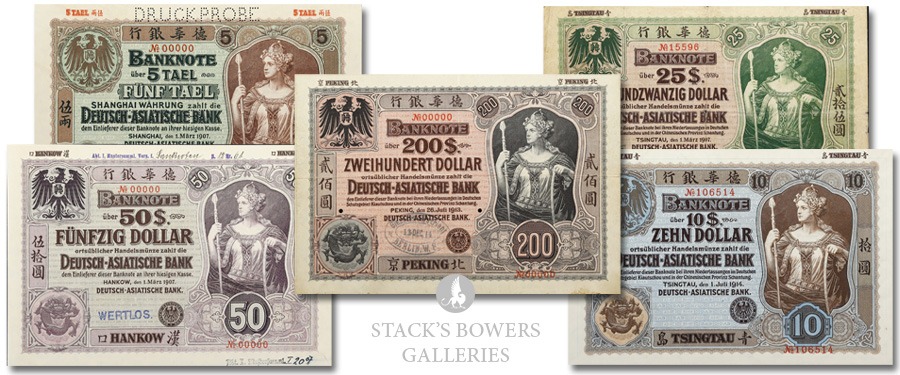
We are proud to present five lots from the Deutsch-Asiatische Bank that will be featured in our October 2024 Hong Kong auction. The group, all from the Al Kugel Collection, includes many extremely rare items that have not been offered in a long while if ever. Of special note is an issued 1907 25 Dollar note from Tsingtau.
The full offering consists of:
5 Tael, Specimen, Shanghai, 1907 in PMG 64-EPQ
10 Dollars, Specimen, Tsingtau, 1914 in PMG 65-EPQ
200 Dollars, Specimen, Peking, 1913 in PMG 45
50 Dollars, Specimen, Hankow, 1907 in PMG 63
25 Dollars, Issued note, Tsingtau, 1907 in PMG 20
The last time that such a formidable array of notes appeared in a single auction was more than 12 years ago and that offering did not contain an issued $25. The few notes seen since then are mainly the Peking 5 Tael and 100 Dollar remainders. Even issued notes in low grade are hard to find.
A couple of Deutsch-Asiatische Bank notes offered in our May Maastricht Auction realized record prices:
Lot 50222: 1 Dollar, specimen, Tsingtau, 1907 in PMG 64 Realized USD$72,000 (including BP)
Lot 50223: 10 Dollars, Specimen, Tsingtau, 1907 in PMG 63. Realized USD$78,000 (including BP)
We hope that these amazing prices will continue in our October auction!
A Brief History of the Bank:
The Deutsch-Asiatische Bank was formed in 1889 in China by a consortium of 13 German banks led by the Deutsch Bank. It acted as an official overseas bank for Germany and dealt with matters such as loans, foreign exchange, investments and issuance of currency.
The first branch opened in Shanghai on 15th May 1889 with a capital of 7.5 million taels. This was quickly followed by Tientsin (1890), Calcutta and Berline (1896), Hankow (1897), Tsingtau (1898), Hong Kong (1899), Tsinan (1904), Peking and Hiroshima (1905), Kobe, Singapore, Hamburg (1906) and Canton (1911). The sheer size of the Bank meant its influence was surpassed only by The Hongkong and Shanghai Banking Corporation before the outbreak of World War I in 1914.
The Bank’s assets in Shantung Province were seized by Japan in 1914, including its railway and mining investments. The Peiyang Government declared war against Germany in 1917 and took over various branches.
The Bank tried to re-establish itself again from 1920 onward but its influence and scale never returned to its prewar size. Starting in 1945 its remaining branches were gradually absorbed by the Bank of China. A few of its branch buildings in contemporary Germanic style still survive today. The Bank continues its current business in China as part of the Deutsch Bank.





